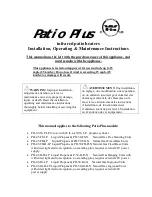
23
Mode Button
The Mode button is used to select POOL or SPA operation.
It allows the user to turn the heater off electronically. The
LCD remains energized and displays OFF, while continues
to show the actual water temperature.
Temp Buttons
If the heater is in POOL or SPA mode, the desired water
temperature (SETPOINT) will be displayed and may be
adjusted using the UP or DOWN buttons.
Operation
In the POOL or SPA modes, the actual water temperature
is displayed along with the desired water temperature
(SETPOINT). When the water temperature is above the
setpoint, “Water Temp” will alternate with “No Demand.”
When the water temperature is below the setpoint and the
heater is firing, “Water Temp” will alternate with “Heating.”
To adjust the setpoint temperature, make sure the control
is in the appropriate mode (POOL or SPA) and push the
UP or DOWN buttons.
By default, the setpoint range is 50-104°F (10-40°C). See
page 24
to increase the MAX setting, if necessary.
Figure 38. Alternating Display During Heating
Program Mode Button (SW1)
Figure 39. Thermostat Program Button (SW1)
Service Menu and Fault History
To access the Service Menu and fault history, press the
MODE and UP buttons simultaneously for 3 to 5 seconds.
The heater will continue to operate while in the Service
Menu. The first screen displayed is the Flame Strength
indicator, which indicates the pilot flame current using a bar
graph and numerical display. A signal of less than 4 bars
indicates a weak flame signal and may require service.
Refer to the Troubleshooting section for possible causes
and corrections.
Figure 40. Flame Strength Indicator
Press the DOWN button. The Supply Voltage screen
indicates the voltage supplied to the control board. Normal
readings range from 24 to 29 volts.
Figure 41. Supply Voltage Indicator
Press the DOWN button. The Run Time indicates the total
hours of operation for the pool heater, as measured by the
amount of time that the main gas valve has been powered.
The Cycle count indicates the number of on/off cycles of
the heater, as measured by the number of times the pilot
valve has been powered.
Figure 42. Run Time/Cycles
Press the DOWN button. The Fault History displays up to
ten faults in memory. The order of the faults begins with
“Fault Last,” which is the most recent fault, and proceeds
through ten most recent messages in chronological order.
The second line of the display shows the fault message.
If there are no faults in the history buffer, the second line
reads “All Faults Clear.”
Figure 43. Fault History Indicator
Содержание 207A
Страница 21: ...21 6 WIRING DIAGRAM...
Страница 46: ...46 NOTES...
Страница 47: ...47 NOTES...
Страница 48: ......
















































